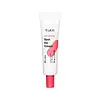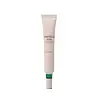What's inside
What's inside
 Key Ingredients
Key Ingredients

 Benefits
Benefits

 Concerns
Concerns

 Ingredients Side-by-side
Ingredients Side-by-side

Water
Skin ConditioningNiacinamide
SmoothingButylene Glycol
HumectantZinc Oxide
Cosmetic ColorantHelianthus Annuus Seed Oil
EmollientGlycerin
HumectantDimethicone
EmollientCetearyl Alcohol
EmollientElaeis Guineensis Oil
Emollient1,2-Hexanediol
Skin ConditioningCetearyl Olivate
Polysorbate 60
EmulsifyingElaeis Guineensis Kernel Oil
EmollientSorbitan Olivate
EmulsifyingBetaine
HumectantHydroxyethyl Acrylate/Sodium Acryloyldimethyl Taurate Copolymer
Emulsion StabilisingXanthan Gum
EmulsifyingSponge
EmollientMelaleuca Alternifolia Leaf Oil
AntioxidantAsiaticoside
AntioxidantMadecassic Acid
Skin ConditioningAsiatic Acid
Skin ConditioningZinc PCA
HumectantLimonene
PerfumingWater, Niacinamide, Butylene Glycol, Zinc Oxide, Helianthus Annuus Seed Oil, Glycerin, Dimethicone, Cetearyl Alcohol, Elaeis Guineensis Oil, 1,2-Hexanediol, Cetearyl Olivate, Polysorbate 60, Elaeis Guineensis Kernel Oil, Sorbitan Olivate, Betaine, Hydroxyethyl Acrylate/Sodium Acryloyldimethyl Taurate Copolymer, Xanthan Gum, Sponge, Melaleuca Alternifolia Leaf Oil, Asiaticoside, Madecassic Acid, Asiatic Acid, Zinc PCA, Limonene
Water
Skin ConditioningMelaleuca Alternifolia Leaf Water 15%
AntimicrobialButylene Glycol
HumectantGlycerin
HumectantEthoxydiglycol
Humectant1,2-Hexanediol
Skin ConditioningDipropylene Glycol
HumectantNiacinamide
SmoothingCaprylic/Capric Triglyceride
MaskingPropanediol
SolventAmmonium Acryloyldimethyltaurate/Vp Copolymer
Glycereth-26
HumectantGlyceryl Stearate
EmollientNeopentyl Glycol Diheptanoate
EmollientOctyldodecanol
EmollientAsiaticoside 0.4%
AntioxidantPanthenol
Skin ConditioningAsiatic Acid 0.3%
Skin ConditioningCetearyl Olivate
Glycolipids
Skin ConditioningHydrogenated Lecithin
EmulsifyingMadecassic Acid 0.3%
Skin ConditioningC12-13 Alketh-9
EmulsifyingSorbitan Olivate
EmulsifyingMelaleuca Alternifolia Leaf Oil 0.1%
AntioxidantPentylene Glycol
Skin ConditioningEthylhexylglycerin
Skin ConditioningCaprylyl Glycol
EmollientChamaecyparis Obtusa Water
MaskingPinus Palustris Leaf Extract
TonicDisodium EDTA
Hyaluronic Acid
HumectantHydrolyzed Hyaluronic Acid
HumectantSodium Hyaluronate
HumectantZea Mays Kernel Extract
Ammonium Polyacryloyldimethyl Taurate
Emulsion StabilisingGluconolactone
Skin ConditioningCentella Asiatica Extract 0.001%
CleansingCapryloyl Salicylic Acid
ExfoliatingFructan
Skin ConditioningGlucose
HumectantCalamine
AbsorbentWater, Melaleuca Alternifolia Leaf Water 15%, Butylene Glycol, Glycerin, Ethoxydiglycol, 1,2-Hexanediol, Dipropylene Glycol, Niacinamide, Caprylic/Capric Triglyceride, Propanediol, Ammonium Acryloyldimethyltaurate/Vp Copolymer, Glycereth-26, Glyceryl Stearate, Neopentyl Glycol Diheptanoate, Octyldodecanol, Asiaticoside 0.4%, Panthenol, Asiatic Acid 0.3%, Cetearyl Olivate, Glycolipids, Hydrogenated Lecithin, Madecassic Acid 0.3%, C12-13 Alketh-9, Sorbitan Olivate, Melaleuca Alternifolia Leaf Oil 0.1%, Pentylene Glycol, Ethylhexylglycerin, Caprylyl Glycol, Chamaecyparis Obtusa Water, Pinus Palustris Leaf Extract, Disodium EDTA, Hyaluronic Acid, Hydrolyzed Hyaluronic Acid, Sodium Hyaluronate, Zea Mays Kernel Extract, Ammonium Polyacryloyldimethyl Taurate, Gluconolactone, Centella Asiatica Extract 0.001%, Capryloyl Salicylic Acid, Fructan, Glucose, Calamine
 Reviews
Reviews

Ingredients Explained
These ingredients are found in both products.
Ingredients higher up in an ingredient list are typically present in a larger amount.
1,2-Hexanediol is a synthetic liquid and another multi-functional powerhouse.
It is a:
- Humectant, drawing moisture into the skin
- Emollient, helping to soften skin
- Solvent, dispersing and stabilizing formulas
- Preservative booster, enhancing the antimicrobial activity of other preservatives
Asiatic Acid is a major component of Centella Asiatica Extract. It has wound-healing, anti-inflammatory, and antioxidant properties.
Studies show Asiatic Acid is able to block the pathway for skin inflammation receptors, helping to soothe skin.
As an antioxidant, asiatic acid helps protect our skin against damaging environmental factors.
Learn more about Asiatic AcidAsiaticoside comes from the super popular skin-soothing ingredient, Centella asiatica. It is one of four active compounds found in the extract of Centella Asiatica.
Asiaticoside is an antioxidant and helps with wound healing. It has been shown to increase antioxidant activity during the wound healing process.
Butylene Glycol (or BG) is used within cosmetic products for a few different reasons:
Overall, Butylene Glycol is a safe and well-rounded ingredient that works well with other ingredients.
Though this ingredient works well with most skin types, some people with sensitive skin may experience a reaction such as allergic rashes, closed comedones, or itchiness.
Learn more about Butylene GlycolCetearyl Olivate is an emulsifier and texture enhancer. It is derived from the fatty acids of olive oil and Cetearyl alcohol, and is biodegradable.
As an emulsifier, it is used to prevent oils and waters from separating. It can also
Manufacturers use the name Olivem 1000. This ingredient has been found to preserve the natural microbiome of skin. Having a healthy microbiome helps keep our skin healthy and protects against harmful bacteria. This ingredient is grouped with Sorbitan Olivate under the name Olivem 1000.
Learn more about Cetearyl OlivateGlycerin is already naturally found in your skin. It helps moisturize and protect your skin.
A study from 2016 found glycerin to be more effective as a humectant than AHAs and hyaluronic acid.
As a humectant, it helps the skin stay hydrated by pulling moisture to your skin. The low molecular weight of glycerin allows it to pull moisture into the deeper layers of your skin.
Hydrated skin improves your skin barrier; Your skin barrier helps protect against irritants and bacteria.
Glycerin has also been found to have antimicrobial and antiviral properties. Due to these properties, glycerin is often used in wound and burn treatments.
In cosmetics, glycerin is usually derived from plants such as soybean or palm. However, it can also be sourced from animals, such as tallow or animal fat.
This ingredient is organic, colorless, odorless, and non-toxic.
Glycerin is the name for this ingredient in American English. British English uses Glycerol/Glycerine.
Learn more about GlycerinMadecassic Acid is a major component of Centella Asiatica Extract. It has anti-inflammatory and antioxidant properties.
It is a triterpenoid, meaning it naturally acts as an antioxidant. Antioxidants protect your skin against damage from environmental factors such as pollution and UV.
Studies show Madecassic Acid helps soothe the skin due to its ability to block inflammation pathways.
Learn more about Madecassic AcidThis tea tree oil comes from the leaves of the Tea Tree plant. Tea tree oil has antioxidant, anti-inflammatory, and antimicrobial properties.
According to the book Journal of Profiles of Drug Substances, tea tree helps in reducing acne-causing bacteria such as Propionibacterium acnes. This is due to the Terpinen components of tea tree oil.
Tea tree may cause sensitivity and irritation for some people. This oil naturally contains fragrance such as linalool and limonene.
However, research shows irritation usually occurs when using pure tea tree oil and not in cosmetic products.
Tea tree oil was found to help relieve the symptoms of psoriasis in one study.
Tea tree oil is toxic when ingested. Another study showed it to caused damage to the nervous system of dogs and cats when applied to their skin or given orally.
Learn more about Melaleuca Alternifolia Leaf OilNiacinamide is a multitasking form of vitamin B3 that strengthens the skin barrier, reduces pores and dark spots, regulates oil, and improves signs of aging.
And the best part? It's gentle and well-tolerated by most skin types, including sensitive and reactive skin.
You might have heard of "niacin flush", or the reddening of skin that causes itchiness. Niacinamide has not been found to cause this.
In very rare cases, some individuals may not be able to tolerate niacinamide at all or experience an allergic reaction to it.
If you are experiencing flaking, irritation, and dryness with this ingredient, be sure to double check all your products as this ingredient can be found in all categories of skincare.
When incorporating niacinamide into your routine, look out for concentration amounts. Typically, 5% niacinamide provides benefits such as fading dark spots. However, if you have sensitive skin, it is better to begin with a smaller concentration.
When you apply niacinamide to your skin, your body converts it into nicotinamide adenine dinucleotide (NAD). NAD is an essential coenzyme that is already found in your cells as "fuel" and powers countless biological processes.
In your skin, NAD helps repair cell damage, produce new healthy cells, support collagen production, strengthen the skin barrier, and fight environmental stressors (like UV and pollution).
Our natural NAD levels start to decline with age, leading to slower skin repair, visible aging, and a weaker skin barrier. By providing your skin niacinamide, you're recharging your skin's NAD levels. This leads to stronger, healthier, and younger looking skin.
Another name for vitamin B3 is nicotinamide. This vitamin is water-soluble and our bodies don't store it. We obtain Vitamin B3 from either food or skincare. Meat, fish, wheat, yeast, and leafy greens contain vitamin B3.
The type of niacinamide used in skincare is synthetically created.
Learn more about NiacinamideSorbitan Olivate is created from the fatty acids in olive oil and sorbitol.
This ingredient is an oil in water emulsifier. It helps stabilize a product by preventing oils and waters from separating. Sorbitan Olivate also helps hydrate the skin.
Manufacturers sell sorbitan olivate under the name OliveM 1000. OliveM 1000 a multifunctional ingredient. It is self-emulsifying. According to a manufacturer, OliveM 1000 does not disrupt natural skin biome.
Due to its olive oil base, this ingredient may not be fungal-acne safe.
Learn more about Sorbitan OlivateWater. It's the most common cosmetic ingredient of all. You'll usually see it at the top of ingredient lists, meaning that it makes up the largest part of the product.
So why is it so popular? Water most often acts as a solvent - this means that it helps dissolve other ingredients into the formulation.
You'll also recognize water as that liquid we all need to stay alive. If you see this, drink a glass of water. Stay hydrated!
Learn more about Water